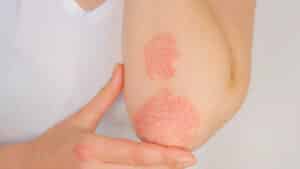Frequently Asked Questions About Psoriasis
 Psoriasis is a chronic autoimmune disease that occurs when the immune system causes skin cells to multiply too quickly. This creates scaly, often itchy patches of inflamed skin to break out in various areas. It’s most common in the scalp, elbows, and knees but can flare up anywhere.
Psoriasis is a chronic autoimmune disease that occurs when the immune system causes skin cells to multiply too quickly. This creates scaly, often itchy patches of inflamed skin to break out in various areas. It’s most common in the scalp, elbows, and knees but can flare up anywhere.
What Causes Psoriasis?
While the exact cause of psoriasis is unclear, some factors can put you at a higher risk of developing psoriasis.
Genetics
If a member of your family has psoriasis, you may be more likely to develop the condition. However, there are a few different genes that could be connected to psoriasis, making it difficult to determine which combination increases a person’s risk. That being said, you can have these genes and never develop the condition.
Immune System
The body’s T-cells are a key component of the immune system and help to prevent us from getting sick by attacking viruses and bacteria. However, in those with psoriasis, the T-cells begin attacking the skin cells instead. It is unclear why this happens, but it may be connected to genetics or environmental factors.
How Can I Identify My Triggers?
Your first case of psoriasis, as well as reoccurring flare-ups, can occur due to a trigger, which may include:
- Stress
- Infections
- Certain medications
- Weather
- Skin injuries
There are many other possible triggers as well. Identifying your trigger is essential to preventing flare-ups and controlling your psoriasis. You can identify your triggers by taking note of what factors may have changed around the time of your flare-up. For example, has the weather been cold and dry recently? Is there an event or situation in your life causing increased stress? Did you recently cut, scrape, or get a sunburn in the area where the psoriasis patch is located?
Speaking with a doctor and keeping a record of your flare-ups as well as events in your life at that time can help you narrow down and eventually determine your trigger.
Can You Stop Psoriasis From Spreading?
Psoriasis can spread to other areas of the body when it is experiencing a flare-up. Therefore, avoiding potential triggers is essential to preventing it from spreading. This may include avoiding alcohol and tobacco products, taking time to destress, wearing sunscreen, and protecting your skin from cuts and scrapes. If you are on medication, speak with your doctor to determine if it is worsening your psoriasis.
Schedule a Consultation
If you have psoriasis and are struggling to keep your condition under control, schedule an appointment with a dermatologist. At Dermatology Consultants of Short Hills, we can provide you with professional psoriasis treatment options in Short Hills, NJ. Call our office today at 973-232-6245 to get started.


